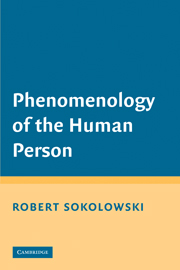Book contents
- Frontmatter
- Contents
- Acknowledgments
- Phenomenology of the Human Person
- Introduction
- PART I THE FORM OF THINKING
- 1 Two Ways of Saying “I”
- 2 Further Kinds of Declaratives
- 3 Linguistic Syntax and Human Reason
- 4 The Person as the Agent of Syntax
- 5 Reason as Public
- 6 Grammatical Signals and Veracity
- PART II THE CONTENT OF THINKING
- PART III THE BODY AND HUMAN ACTION
- PART IV ANCIENTS AND MODERNS
- 19 Conclusion, with Henry James
- Bibliography
- Index
4 - The Person as the Agent of Syntax
Predication
Published online by Cambridge University Press: 05 June 2012
- Frontmatter
- Contents
- Acknowledgments
- Phenomenology of the Human Person
- Introduction
- PART I THE FORM OF THINKING
- 1 Two Ways of Saying “I”
- 2 Further Kinds of Declaratives
- 3 Linguistic Syntax and Human Reason
- 4 The Person as the Agent of Syntax
- 5 Reason as Public
- 6 Grammatical Signals and Veracity
- PART II THE CONTENT OF THINKING
- PART III THE BODY AND HUMAN ACTION
- PART IV ANCIENTS AND MODERNS
- 19 Conclusion, with Henry James
- Bibliography
- Index
Summary
It is a traditional doctrine in philosophy that predication or judgment is the central activity of reason. Aristotle calls it apophansis, and describes it with the cryptic phrase ti kata tinos legetai, “something is said of something.” In Kant's writings the term is Urteil, judgment; all acts of the understanding can be reduced to judgment. Bickerton agrees with this consensus and relates predication to syntax. He says, “If nouns and verbs are the most basic elements of syntax, then predication is its most basic act.” The most basic act in syntax, the most fundamental thing done in it and that without which nothing else can be done, is predication. Syntax is, of course, immensely rich and varied. There are in the world's languages untold forms of subordination, conjunction, correlation, reciprocity, reflexives and possessives, tenses and cases, adjectives and adverbs, infinitives and gerunds, but underlying all of them is the never-absent form of predication, in which something is said of something else. All the other forms dangle from this or crowd around it. The heart of syntax is predication.
Bickerton adds the further refinement that, in his linguistic theory, the subject and predicate themselves should be considered not as single words but as explicit or implicit phrases. This is an interesting claim, and it would imply that even single words are latent combinations, hence syntactically structured in principle.
- Type
- Chapter
- Information
- Phenomenology of the Human Person , pp. 48 - 67Publisher: Cambridge University PressPrint publication year: 2008

